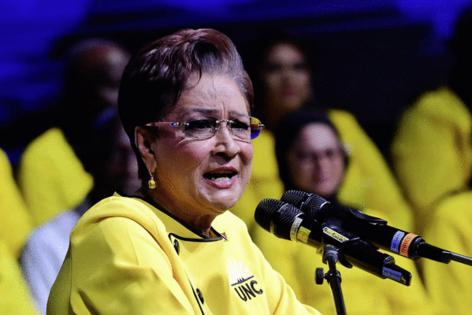Kamla Persad-Bissessar returns to power in 'decisive victory' in Trinidad and Tobago
Published in News & Features
Trinidad and Tobago’s United National Congress has ended its nearly 10-year-political drought and returned to the helm of governance after party leader Kamla Persad-Bissessar staged the biggest political comeback in the country’s history.
Persad-Bissessar, who served as prime minister from 2010-15 and had long lived under the shadow of late party leader Basdeo Panday, led the UNC to a sweeping victory on Monday night. The Indo-Trinidadian-dominated party won 25 seats out of 41.
The Peoples National Movement party, which had led the Caribbean nation through two consecutive terms, won just 14 seats. Among the eight seats the party PNM lost were its a nearly 40-year stronghold in the area of La Brea, and two in Tobago. The two seats went to the Tobago People’s Party.
“The decisive victory is a clear mandate from the people of Trinidad and Tobago,” the 15-member Caribbean Community regional bloc, CARICOM, said in a statement Tuesday.
Ahead of the parliamentary elections, CARICOM deployed an eight-member team headed by Antigua and Barbuda Supervisor of Elections Ian Hughes to observe the vote. There were a total of 161 candidates representing 17 political parties, the regional bod said.
“We look forward to welcoming Prime Minister-elect Persad-Bissessar to the Conference of Heads of Government, and to her participation, as we continue to tackle emerging geopolitical issues, and seek to further improve the welfare and well-being of the people of the region,” the CARICOM statement said.
Congratulatory notes also poured in from regional leaders, including Dominica Prime Minister Roosevelt Skerrit, who said his eastern Caribbean nation looks forward to “working closely to strengthen our existing ties for the mutual benefit of our peoples and for the advancement of our Caribbean Community.”
Barbados Prime Minister Mia Mottley, who also serves as chairwoman of CARICOM and presently the only other woman leading a government in the region, welcomed Persad-Bissessar and congratulated “the people of Trinidad and Tobago on the peaceful exercise of their democratic rights.”
“In a world where democracy is often tested, Trinidad and Tobago has shown that true strength lies in the commitment of its people to participation, fairness, and free expression,” Mottley said.
In a speech late Monday, Persad-Bissessar, flanked by supporters in yellow, thanked her coalition partners and rank-and-file members of the UNC.
“You are the real heroes in this story of Trinidad and Tobago,” she said about the nation of 1.3 million residents. “This victory is for the senior citizens to keep their pensions. This victory is for public servants to get their rightful salaries. This victory is to reopen the children’s hospital. This victory... is to once again give laptops to our children. This victory is to create over 50,000 jobs.”
Persad-Bissessar’s return after a decade is the longest stretch for a leader in the twin-island republic that faces a litany of challenges, including rising violent crime, migration from neighboring Venezuela and tariffs on its imports from its largest trading partner, the United States.
PNM leader Keith Rowley, who stepped down as prime minister in March and passed the baton to his protégé and energy minister Stuart Young, conceded the elections even before the official tally was in. At around 10:15 p.m., he acknowledged that it “was not a good night” for the Afro-Trinidadian-dominated party. As the votes rolled in, Rowley said, “it is clear at this time that we have lost the election.”
Rowley had been elected to two consecutive five-year terms, but in a historic transition opted to have Young finish his term as party leader after announcing he would retire from politics. A day after assuming the prime minister’s job, Young called for new parliamentary elections in a bid to get his own mandate. He now enters the history books as the shortest-serving prime minister in Trinidad history with just 43 days in office, as the PNM decides who will be the leader of the opposition
On the campaign trail, Persad-Bissessar, 73, was dogged by questions about her age, in comparison to Young, 50. Some political observers see the UNC’s return as a rejection of Rowley and his succession maneuver in tapping Young without voters’ approval.
As she unveiled her slate of candidates two days before the general election, Persad-Bissessar announced that she had “purged the politics of caste, class, nepotism, family connections, segregation, discrimination and dynasty from the UNC.”
Martin G. Daly, a lawyer who writes a weekly column in the Sunday edition of the Trinidad Express, said that Persad-Bissessar has her work cut out. On the campaign trail, both the UNC and PNM failed to articulate their positions on a number of key issues, including how they plan to confront violent crime and drastic revenue shortfalls. The UNC also didn’t say how the party, once in government, plans to pay for the array of promises Persad-Bissessar reiterated in her victory speech Monday night.
Citizens were being asked to make choices “without knowing sufficient about the true nature of intentions of the party” they were choosing, Daly wrote in a column he shared with the Miami Herald.
“To a large extent, we will be buying cat in bag when we vote,” he said.
________
©2025 Miami Herald. Visit miamiherald.com. Distributed by Tribune Content Agency, LLC.







Comments